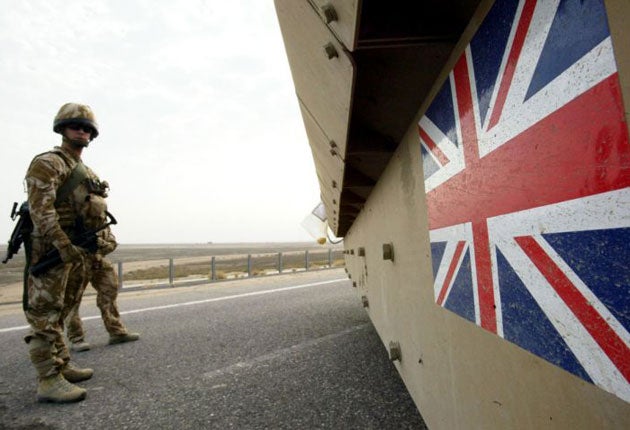British troops to start Iraq pullout in March

Your support helps us to tell the story
From reproductive rights to climate change to Big Tech, The Independent is on the ground when the story is developing. Whether it's investigating the financials of Elon Musk's pro-Trump PAC or producing our latest documentary, 'The A Word', which shines a light on the American women fighting for reproductive rights, we know how important it is to parse out the facts from the messaging.
At such a critical moment in US history, we need reporters on the ground. Your donation allows us to keep sending journalists to speak to both sides of the story.
The Independent is trusted by Americans across the entire political spectrum. And unlike many other quality news outlets, we choose not to lock Americans out of our reporting and analysis with paywalls. We believe quality journalism should be available to everyone, paid for by those who can afford it.
Your support makes all the difference.Britain will begin withdrawing its 4,100-strong force from Iraq by the beginning of March, with almost all troops leaving within a few months, a senior defence source revealed yesterday. The Prime Minister is expected to announce the pullout that, in effect, ends the UK's engagement in one of the most controversial wars in recent times, in the Commons next January.
Most of the helicopters and unmanned Predator aircraft will be transferred to Afghanistan, and ministers will consider whether to send extra troops to Helmand for a temporary "surge" in time for the country's elections in September next year. The UK forces in Basra are to be replaced by American troops who are expected to set up their southern Iraq headquarters in the city. As well as guarding the Iranian border, the US contingent will safeguard supply lines into Iraq.
A small detachment of UK troops of about 400 will remain behind, with an officer with the rank approximating a brigadier, to train Iraqi forces. Britain will continue to train the Iraqi navy and also set up and run a staff college for officers in the country's armed forces.
Gordon Brown had said this year that there would be a "fundamental change of mission" in Iraq in 2009. The exact timetable of the withdrawal could not be formulated during negotiations with the Iraqi government of Nouri al-Maliki over the crucial Status of Force Agreement (Sofa) to work out the conditions of the troops leaving as well as those who would be staying behind. That agreement is now expected to be signed by the end of the year after approval by the Baghdad parliament.
The British military, it seems, had been moving equipment out of Iraq for some time in anticipation of the drawdown, in an operation codenamed Archive. The gradual removal of assets is designed to minimise the need for long convoys heading out of Basra towards the Iraq border which would present a target for the militias to attack.
American and British commanders say that disengagement from Iraq, with the loss so far of 177 British service personnel and thousands of Iraqis, can be done because there has been a dramatic improvement in the security situation in Basra and other southern areas since the operation, Charge of the Knights, conducted by Iraqi government, US and British forces this year.
Unlike Afghanistan, where British and Nato forces face daily attacks, there have only been isolated incidents, either with roadside bombs or firearms, in the past few months.
There has also been a notable decline in the supply of weapons and explosives across the Iranian border, and a decrease in what was claimed as Iranian attempts to destabilise Iraq. It appears, said the senior officer, that Tehran did not want an unstable country next door and accepted that Iraq will play its role as a Shia power in the region. Senior British officers are also of the opinion that the radical cleric Muqtada al-Sadr, the leader of the Shia Mahdi Army, will enter the political process.
Join our commenting forum
Join thought-provoking conversations, follow other Independent readers and see their replies
Comments